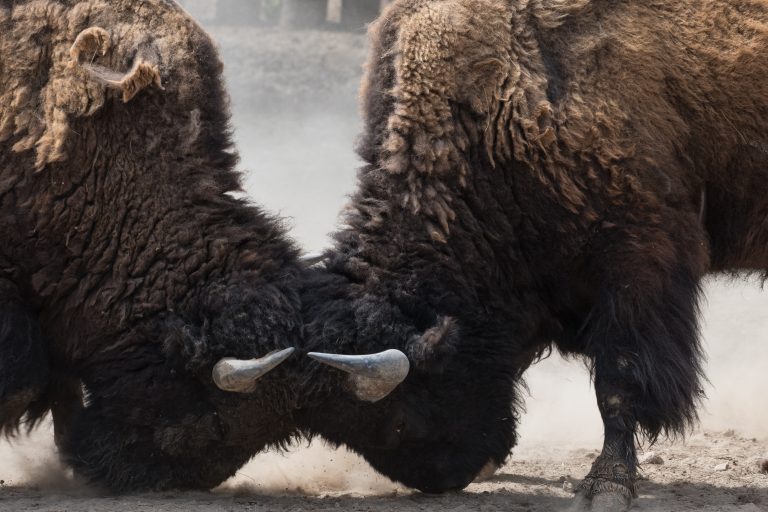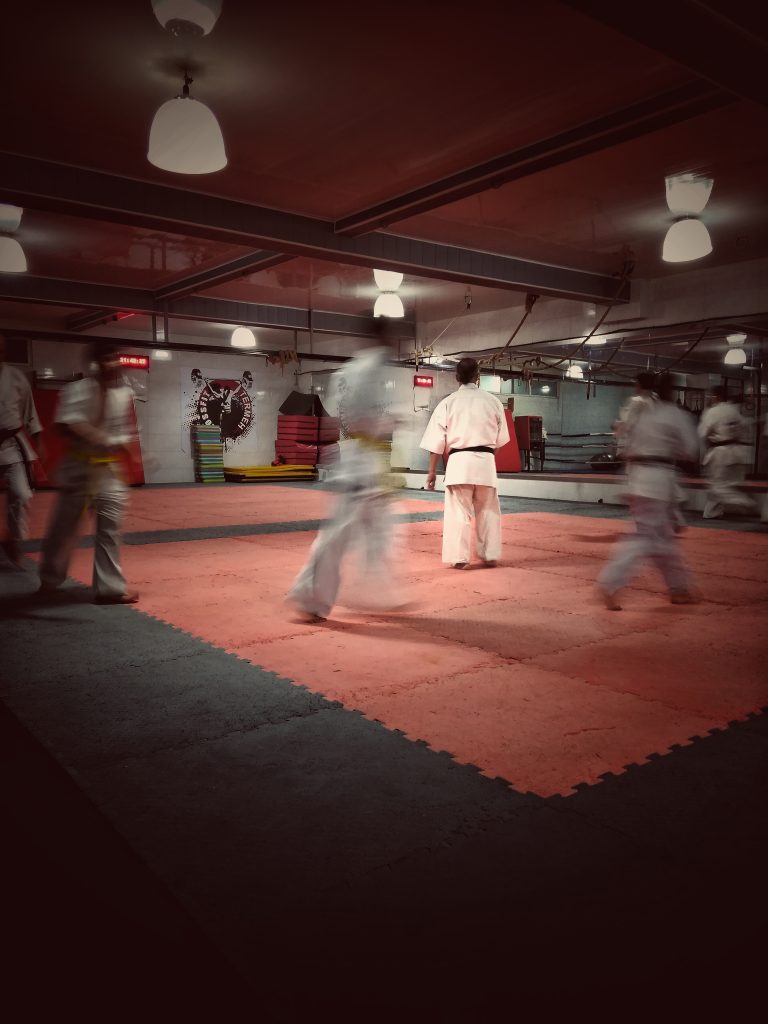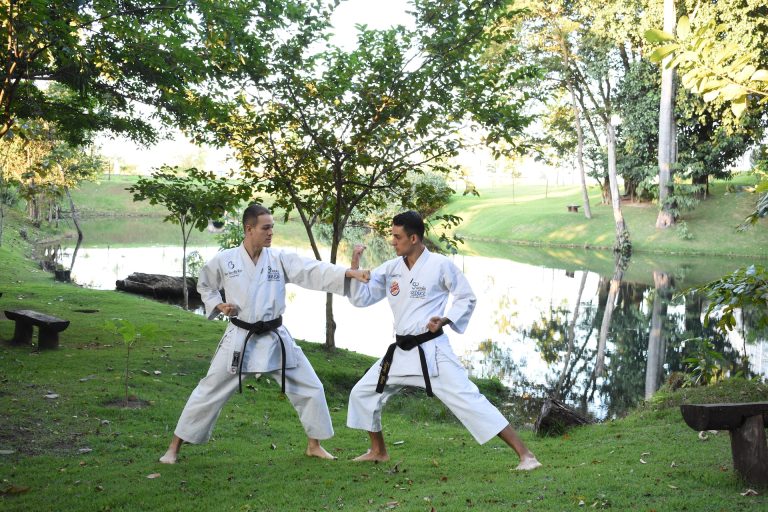Karate: What are the Benefits for Young Children?
Children who participate in martial arts such as karate can expect to develop strong, healthy bodies. Karate is also a great way for youngsters to build self-confidence, bring focus to their lives, and learn important values like discipline, respect, and dedication. In this blog post, we’ll look at the specific benefits karate can bring to young children.
Karate Teaches Focus and Self-Discipline
One of the most valuable aspects of karate for children is the focus it requires. Karate is a difficult activity, in which children must not only physically perform certain movements correctly, but must do so while continuing to watch and listen to their instructor. This teaches your child invaluable lessons in focus and self-discipline.
In karate, children must repeat moves slowly and precisely while they focus their attention. The practice helps children to stay on task, tune out distractions, and finish what they start. For example, children may practice one specific move hundreds of times until they perfect it. This reinforces the idea that it is important to practice something until they understand it fully.
Karate also encourages children to embrace challenges and fears. Children may become frustrated at times when they cannot nail a particular move or technique. However, through perseverance, they can learn that it is okay to make mistakes; eventually, with hard work and dedication, difficult tasks can become achievable.
Karate Provides Exercise and Strength Training
Karate is both a physical sport and an art form requiring agility, strength and balance. Its benefits include improved agility, speed, coordination, and flexibility. You can also expect your child’s balance and fine motor skills to be refined as he or she develops an understanding of different stances and movement patterns.
Karate is a physically demanding activity that works many different muscle groups. Participating in karate strengthens not just muscles but core strength and endurance as well; in order to maintain balance and control of their bodies during practice, children must continually use their core strength and develop greater endurance over time.
Karate Teaches Respect and Social Skills
Karate is an inherently social activity that requires respect for both your instructor and other students. By participating in karate class with others of different ages and abilities, your child will learn to negotiate social situations respectfully. Children quickly learn how to interact with others without resorting to raised voices or physicality; rather, they learn to listen to one another’s perspective and collaborate in class work.
Classes also teach children important manners, such addressing instructors as “sensei”, bowing to the instructor upon entering the dojo/studio, bowing to other students before engaging in a drill/sparring/training exercise. All these social skills are incredibly beneficial for young children; they’ll take these lessons outside the dojo as well, helping them to better prepare for the real world when they become adults.
Karate Builds Confidence and Encourages Self-Esteem
Karate student must continuously strive to learn new techniques that require time for execution. As children practice and gain proficiency in these techniques, their confidence grows tremendously. From learning proper moves to sparring with peers under the supervision of instructors and being awarded a higher belt level after years of hard work and dedication come substantial rewards that can help motivate your child to reach his/her goals in other areas as well.
As karate students gain more experience with the different techniques available to them, it is a natural consequence that their confidence in their own skills will grow. This can ultimately lead to an improvement in children’s overall self-esteem and social interactions. A sense of accomplishment promotes physical and emotional well-being in children throughout their childhood years.
Safety Precautions And Other Considerations In Karate For Young Children
Although karate has many benefits for young children, it’s still important to keep safety in mind while they practice it. Make sure your child wears appropriate attire during class and is up-to-date with any safety courses/special training as may be appropriate. It is also important for instructors to monitor all students during drills or sparring, as strikes to the head or neck should always be avoided in children’s specific classes, or all required protective gear should be employed if necessary.
It is essential for your child’s karate school/dojo to have a code of conduct that places safety first at all times — this should always be enforced within classes for younger students especially. Ultimately you can make sure your child is having fun while learning through karate if you follow the rules and take into account any specific considerations related to younger students differently from those that apply to adults or more senior students.
Conclusion
Karate has many benefits for young children; by participating in this traditional martial art, children will learn how to focus on tasks more effectively, how to self-discipline themselves, how to build physical strength, how to build confidence in their own skills and how to properly navigate social situations with respect and courtesy. Karate still holds great potential whenever it is applied: as adults in society we can use the same principles taught through this traditional martial art in our professional lives.
The most important thing when it comes to bringing your child into such classes is making sure that safety guidelines are strictly followed at all times, as well as looking into ways of making sure your child is having fun while learning — from incorporating fun competitive games or role-playing activities into the classes or allowing them time to bond with other students during class sessions or even attending sports events outside of the dojo for some extra motivation or rewards. By providing your child with a safe environment combined with a solid foundation of life skills from karate, you’ll no doubt be able to help your little one cultivate strong values that will last them a lifetime.
References:
Kolette Cloud, et al., “Martial Arts Benefits for Young Children”, University of Louisville School of Nursing: https://louisville.edu/nursing/resources/martialartsbenefitsyoungchildren
Matt Molloy., “The Psychological Benefits Of Karate For Kids”, Huffington Post: https://www.huffpost.com/entry/the-psychological-benefits-of-karate-for-kids_n_50b85a72e4b08c8d04bbea30
Diane Berenbaum., “How Karate Is Beneficial To Kids”, Verywell Family: https://www.verywellfamily.com/how-karate-is-beneficial-to-kids-4108016
Justin Berdahl., “5 Benefits of Martial Arts for Kids”, NoMMAFighting: https://www.nommafighting.com/benefits-of-martial-arts-for-kids/
Inhaltsverzeichnis






